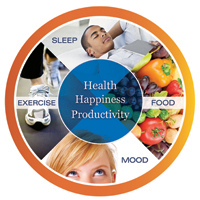“Do you enjoy going to work every day?” may be one of the most pertinent yet most overlooked health promotion questions ever asked. It turns out that whoever said that work isn’t work unless it is tedious, tiring, or painful had it all wrong.
After studying well-being in more than 150 countries and interviewing people of all ages for roughly 60 years, here’s Gallup’s insight:
“Career wellbeing might be one of the most important priorities to consider for maintaining good health over the years,” say Tom Rath and Jim Harter, authors of Wellbeing: The Five Essential Elements.
 It makes sense. At work, lower well-being usually means higher stress and anxiety. Higher stress and anxiety translate into higher cortisol levels in the body, which can lead to insomnia, increased appetite, weight gain, a weakened immune function, an impaired cardiovascular system, and accelerated brain cell loss. As if this weren’t enough, Rath and Harter also found that as engagement at work goes down, cholesterol and triglycerides tend to rise.
It makes sense. At work, lower well-being usually means higher stress and anxiety. Higher stress and anxiety translate into higher cortisol levels in the body, which can lead to insomnia, increased appetite, weight gain, a weakened immune function, an impaired cardiovascular system, and accelerated brain cell loss. As if this weren’t enough, Rath and Harter also found that as engagement at work goes down, cholesterol and triglycerides tend to rise.
Thankfully, there is an upside. Rath and Harter’s research shows that improving career well-being and engagement at work has all the opposite effects. They further report that people who have the opportunity to focus on their strengths at work are three times as likely to report having an excellent quality of life in general.

This research ties very well with my strengths-based approach to health behaviors, which shows that our sleep, food, mood, and exercise habits mutually reinforce each other thanks to the biochemical activity that each generates in the body. In other words, doing better in any of these four categories creates a snowball effect that boosts the other three. Our health behaviors are best improved by looking at the whole and leveraging these parts. Working on a single habit in isolation is as effective as buying a cell phone without a charger. When you run out of juice it’s game over.
Happiness researchers Ed Diener and Robert Biswas-Diener took a different approach. Rather than study biochemical activity and its repercussions, they looked at people’s behaviors directly. They confirmed that happier people tend to have better health habits.

For the linguists and other sharp-witted readers, let me be precise: Rath and Harter define career well-being as being satisfied with what you do everyday, whether you are a C-suite executive, a volunteer, or a homemaker. I have yet to meet someone who despises what she does all day and stands out as Little Miss Sunshine at the same time. It just doesn’t happen very much.
So, career well-being has considerable repercussions on our mood and overall health habits. For the employed, the biggest determinant of career well-being is the immediate superior. Like it or not, your boss has a major impact on your health. Working with a good boss could be even more important than choosing the ideal doctor- no disrespect to anyone who has had the courage, talent, and dedication to survive through med school.
If you need help dealing with a toxic boss, check out the soon-to-be released Profit from the Positive, by Margaret Greenberg and Senia Maymin. They offer tools for positive contagion. Or consult Jane Dutton’s chapter about corrosive bosses. If neither works, consider that even in these lack-luster economic times, a new boss to work with is easier to find than a new body to live in…

